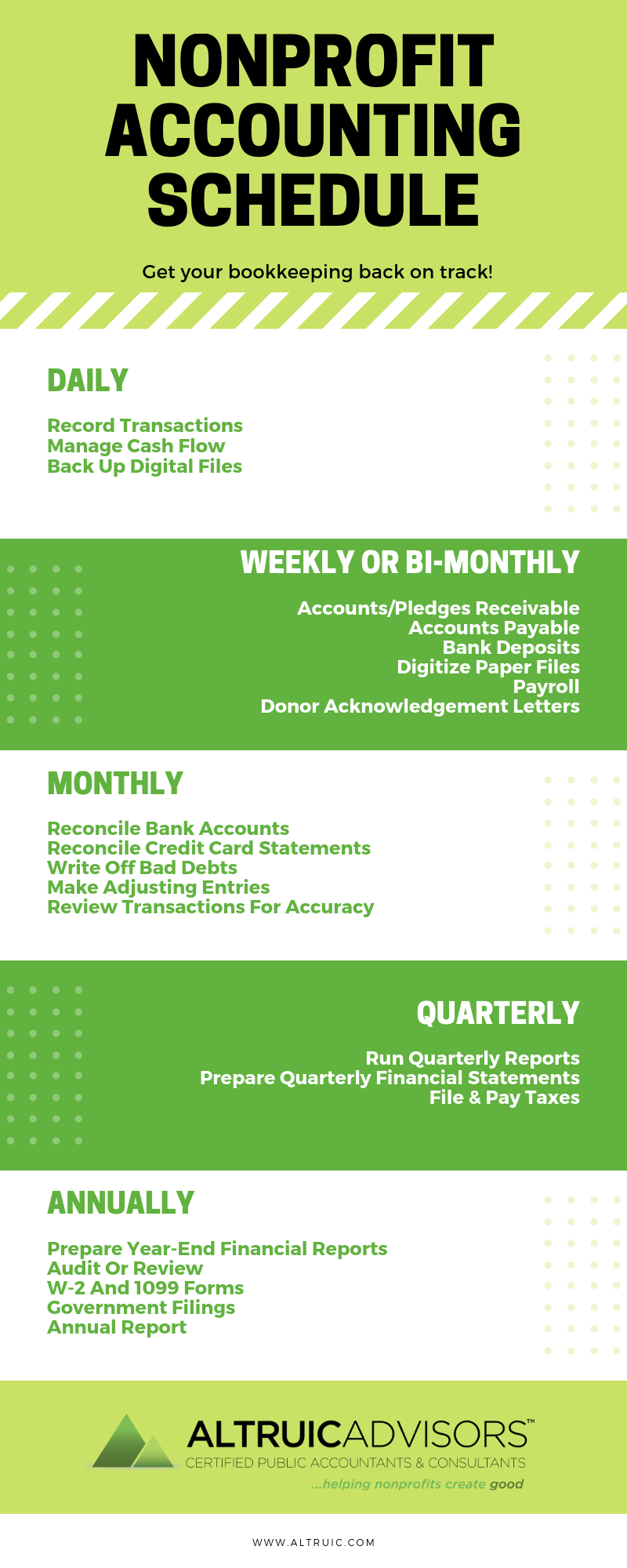The secret to better bookkeeping is simple – stick to a schedule! In every nonprofit organization, there are tasks that should be completed on a daily, weekly, monthly, quarterly, and annual basis.
Daily
Record Transactions
Payments, deposits, invoices, and other financial transactions should be recorded immediately in your accounting system.
Manage Cash Flow
Always be aware of how much cash you have on hand. A bill payment system like Bill.com can help manage cash flow, so you’re never caught by surprise.
Back Up Digital Files
Your files should be backed up on a daily basis to prevent data loss.
Weekly or Bi-Monthly
Accounts/Pledges Receivable
Review any unpaid invoices or pledges and follow up about overdue balances.
Accounts Payable
Code bills to the appropriate expense account, obtain authorized approval (according to your internal controls policy), and remit payment to the vendor.
Bank Deposits
Deposit checks and cash at the bank. This may need to be done more or less frequently depending on your organization’s revenue.
Digitize Paper Files
Scan in any paper documents you have received and save them to a secure, cloud-based document storage system for easy access. Consider reaching out to your vendors or service providers to request that future documents be sent in a digital format.
Payroll
Run payroll for your employees. Use an integrated payroll system with direct deposit and electronic pay statements to save time.
Donor Acknowledgement Letters
Send acknowledgement letters for donations received. Compare with your accounting records to ensure nothing has slipped through the cracks.
Monthly
Reconcile Bank Accounts
Make sure all transactions for the month have been entered into your accounting system.
Reconcile Credit Card Statements
Obtain receipts for all credit card charges, and use a clearing account to make it easier to reconcile credit card transactions. Report any fraudulent transactions to your credit card company immediately.
Write Off Bad Debts
Write off any income that you are certain you will not be able to collect on.
Make Adjusting Entries
Prepaid expenses, deferred revenues, and depreciation may need to be recorded through journal entries.
Review Transactions for Accuracy
Review your general ledger and run class reports to ensure everything has been allocated to the correct accounts and/or classes in your accounting system.
Quarterly
Run Quarterly Reports
Review your Statement of Activities, Statement of Financial Position, and Budget-To-Actual reports. Evaluate your financial standing based on projections and previous fiscal periods.
Prepare Quarterly Financial Statements
Prepare any necessary reports for your board of directors and grantors/funders.
File & Pay Taxes
Make quarterly tax payments for payroll, sales tax, or any other taxes your organization may owe. Avoid late fees and penalties by filing on time.
Annually
Prepare Year-End Financial Reports
Review your full-year financial reports and analyze your annual financial goals. Make an actionable plan for future years.
Audit or Review
Many nonprofits are required to undergo an annual audit or review as a condition of their funding.
W-2 and 1099 Forms
Regardless of when your organization’s fiscal year ends, the IRS requires employee W-2 forms (or 1099-MISC forms for independent contractors) to be filed by January 31st of each year.
Government Filings
File your IRS Form 990 and any other necessary reports or registrations, such as charitable solicitation registrations or sales tax licenses.
Annual Report
Use your financial records to develop a powerful and accurate annual report with plenty of hard data to share with your donors and supporters.

